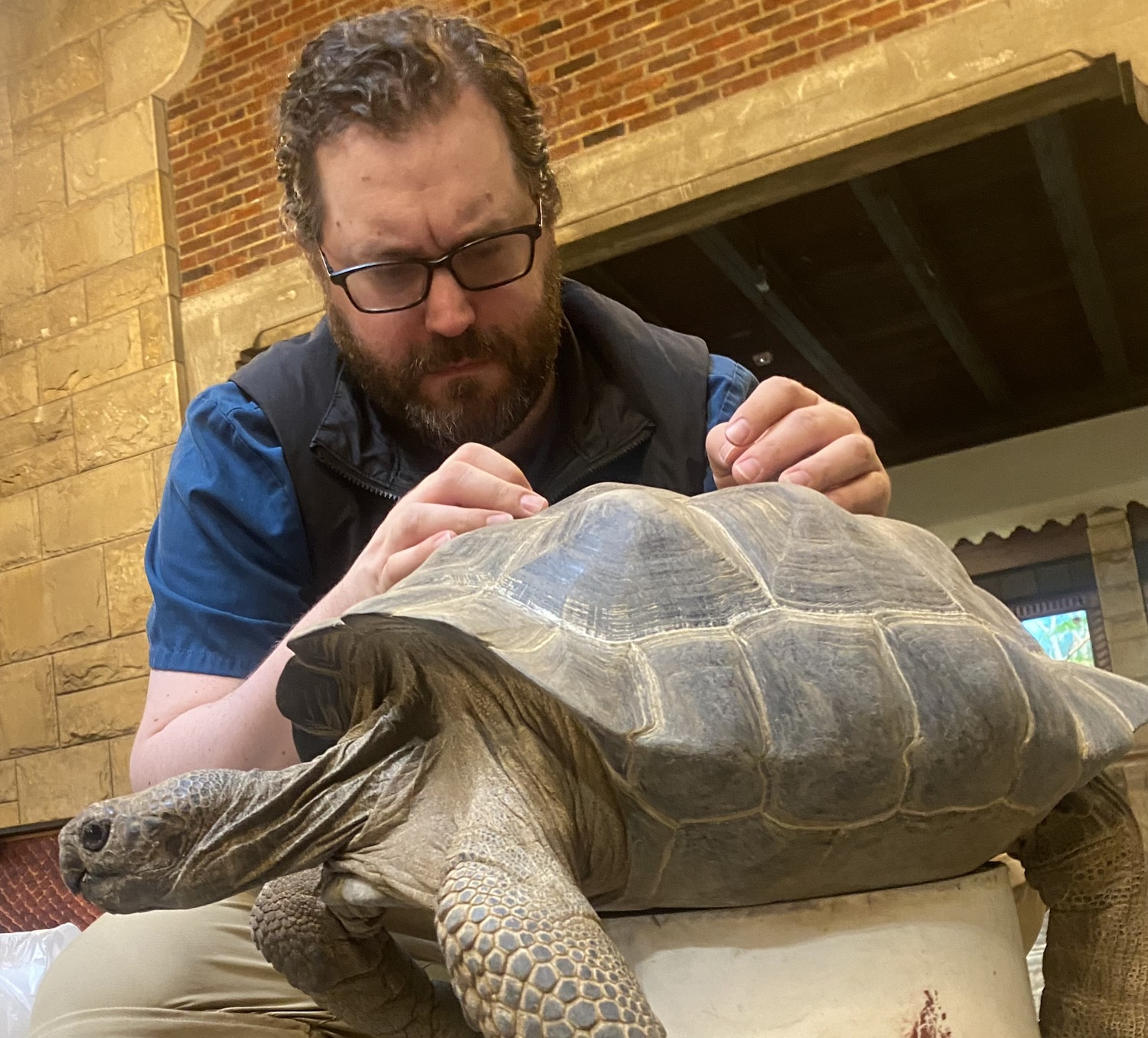
When Dennis Michels was in kindergarten, a teacher passed around a book asking students what they wanted to be when they grew up.
He wrote “veterinarian.”
It is perhaps too rare that childhood dreams survive the trials and tribulations of adolescence, early adulthood and the pressures of the modern world. But for Michels — who is now in his eighth year as a clinical veterinarian for the Toledo Zoo & Aquarium in Toledo, Ohio, after turns at Plum Island, the Bronx Zoo and Central Park Zoo, and a veterinary hospital in Houston — being a veterinarian was always much more than a childhood dream.
“I just knew it’s what I was going to do,” he said recently from Toledo. “When I was young, I had fish and lizards and fancy mice. I loved all sorts of animals. And when I was at East Hampton High School, I did a shadow program internship at South Fork Animal Hospital, and saw what it was like to be a vet in a hospital, and I really liked it.”
He earned an undergraduate degree from SUNY Delhi and an associate’s degree from Pace University in veterinary technology — a veterinary nursing degree, basically — and worked as an intern at the Central Park Zoo.
He was accepted at the University of Pennsylvania’s veterinary medicine program, one of the most respected of its kind in the nation. While at Penn, he did doctoral intern rotations at the Bronx Zoo and New York City animal clinics, then a veterinary hospital in Houston that catered to a large number of exotic pets like wallabies and ocelots.
“I decided I really liked it at the zoos,” he said. “Every day is different at a zoo. You’re treating so many different species in a day, and I really liked the excitement and variety of that.”
But career building must follow a plodding path, and finding a job in the veterinary world isn’t always as easy as getting a wallaby to eat a eucalyptus leaf. He landed a coveted fellowship at Plum Island, home of the federal Plum Island Animal Disease Center, an underground disease research laboratory that studies and looks for ways to counter disease outbreaks that can wipe out important livestock.
For two years, he lived in Mattituck and took the daily ferry to the island off Orient, which is shrouded in secrecy and off-limits to the public — or wild animals.
“Everyone thinks it’s like Stargate. But the place was built in the 1950s — it’s more like being in the hull of a ship with concrete walls, or the inside of a warehouse,” said Michels, whose father, Ed, was the commander of the U.S. Coast Guard Station in Montauk and recently retired as the head of East Hampton Town Marine Patrol.
“They mostly have livestock there — pigs, goats, sheep, horses — so working there gave me good training on animals that I actually hadn’t worked with very much having been at zoos and animal hospitals mostly up to that point,” he said. “I really liked everyone there. It was a great community, and it felt good to be part of something bigger like vaccine research and helping to keep people from getting sick, which is very satisfying.”
Michels wasn’t a part of conducting the experiments himself, his role was to care for the animals kept at the facility, but he said that the realities of the work there, that many of the animals would die during the studies they were being used for, was taxing.
He landed next at the Toledo Zoo through an internship program on the clinical care team. When the internship came to an end, he was hired as a permanent member of the team of three doctors.
Returning to zoo work brought him back to the stunning variety of animals and types of care that are needed in what is in effect a small city for the animals. There have been pacemakers for apes — and even one for a Tasmanian devil, a first — and ultrasounds on pregnant primates, colon surgery on a lizard, a C-section for a colobus monkey.
“We have a huge diversity of creatures, of course — a lot of birds and a lot of reptiles,” he said of the Toledo facility. “We have a huge collection of pheasants, and we’re working on the effects of West Nile Disease on birds, because a lot of exotic species are susceptible to West Nile. We’re vaccinating them with a vaccine that is actually made for horses.”
In his spare time, he has also volunteered at a local wildlife rescue center, nursing wild animals back to health so that they can hopefully be released again.
Michels is now working on a paper on veterinary cardiology, the publishing of which will be the final phase of his six-year training in a veterinary specialty — a key that will open many more doors in the veterinary world for him when he decides to move on from Toledo.
“I would like to move on to do work with some different species,” he said. “I see a lot of jobs overseas that I would like doing, and I’d like the idea of doing conservation work.”
But there are other pressures, too, that make moving farther away from home a testing choice.
“My parents,” he said. “They would like me to move back to New York.”
The Bronx Zoo, after all, isn’t far from home.